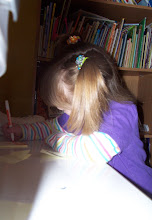Just because you are the teacher does not mean that you stop learning. I have learned more from my little ones and their families over the past two years of teaching and my five years in college than I feel that I could have ever offered to them. I clearly remember sitting in as an observer while still in college on a discussion between a parent and one of the directors of the school where I was student teaching. The parent had two beautiful and amazing children who had been enrolled at the school, twins whom I had worked with the previous year. One of her children had been born with a significant brain abnormality, and while he demonstrated no motor delays he had significant cognitive, social, and language delays as a result. He had absolutely charmed me when I worked with him, and had stolen my heart. Her other child had been born without any complications, but later while still in the hospital had suffered a spinal cord stroke and was paralyzed from the mid chest down. She had significant motor limitations, but was not delayed in her cognitive, social, or language skills (speech was impacted by her ability to control breathing somewhat). She too had stolen my heart as I marveled at her quick wit and incredible independence. The parent was discussing her love for both children, but the incredible injustice that she felt at times. They had just had a birthday party for the little boy (They were twins but did not share a birthday - one child was delivered, then labor stopped and held off for a period of time before the second child delivered) and she was saddened by how he was unable to participate with the other children and instead spent the time running around in his "own world". She then was talking about how proud she was of the little girl, but how she was still mad because she was supposed to be her child that was born healthy, the child of unlimited promise to "compensate" for all that was "lost" with her brother. This very personal conversation, which I felt honored to be a part of, opened my eyes to the depth of emotion that comes with having a child with special needs. It took the theoretical of "what if" and gave it a face, a name, and a heart. I had never before truly considered the multitude of emotions, of the daily frustrations and heartbreaks as well as joys and celebrations, of the questions without answers and the need to create new answers that seem to be a part of being a parent of a child with special needs.
In that moment I recognized that I would never be the expert sitting at the table when I was meeting with a parent about their child, and that to behave as if I was would be to do a complete disservice to the child and to the family. I may be an expert in the field of education, but in regards to that particular child their parents and family members have earned a degree of information that I can never aspire to holding, but that I desperately need to work with in order for the educational process to be successful. I may have a child in my class for 7 hours per day, but their parents and family have them in their homes and in their hearts 24 hours per day, 7 days per week, 365 days per year. Even if I think I know what is best, I can not pretend to know the impact that the needs of a child have had on a family. That is when I need to listen, to work with parents to arrive at a solution or a plan that will be successful not just for the child but for the entire family, to form a collaborative team rather than oppositional forces. I always have as my goal a teaching environment where parents feel comfortable expressing concerns, asking questions, sharing information, and knowing that they are a critical part of a team that is working towards providing the best education possible for their child. Teaching without being aware of the impact that a child's needs has on their family, or the needs/concerns/information/ideas that their family may have, is to teach incompletely and to only part of the child. Children are part of a family and a community and it is my job as an educator to provide information, support, assistance, and to collaborate with their family/community. Only then am I educating the entire child and only then will I be successful.
Sunday, June 22, 2008
Subscribe to:
Post Comments (Atom)






2 comments:
"In that moment I recognized that I would never be the expert sitting at the table when I was meeting with a parent about their child, and that to behave as if I was would be to do a complete disservice to the child and to the family."
Do you know how brilliant you are? :)
May your wisdom spread to the masses!
I really loved reading your take on this subject. You are a very smart woman. Those same concepts can be used in my profession (nursing) as well.
Post a Comment